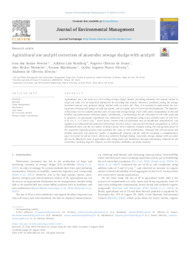Agricultural use and pH correction of anaerobic sewage sludge with acid pH.
Agricultural use and pH correction of anaerobic sewage sludge with acid pH.
Summary: Agricultural use is the main way of recycling sewage sludge. Besides providing nutrients and organic matter to crops and soils, it is an important alternative for recycling this residue. However, problems during the sewage treatment process may generate sludge batches with an acidic pH. Thus, it is essential to understand the consequences of using such sludge on soils and plants, and to explore ways to overcome this limitation. The objective of this study was to evaluate addition rates of anaerobic sewage sludge (ASS) with acidic compositions on the soil fertility and performance of lettuce plants. Additionally, a methodology for pH correction of ASS with acidic pH is proposed. An agronomic experiment was conducted in a greenhouse using seven addition rates of ASS (0.0, 0.25, 0.5, 1, 2, 4 and 8 g kg−1 in dry basis), treated with an additional step of disinfection (solarization), and applied in an Albaqualf soil cultivated with lettuce (Lactuca sativa). Soil and leaf chemical composition, as well as chlorophyll index and the dry matter of lettuce leaves were evaluated. Failures during the acidogenesis phase of the anaerobic digestion process were probably the cause of ASS acidification. Although this ASS increased soil fertility indicators and plant dry matter, it significantly reduced soil pH, thereby requiring a complementary assay to correct its pH up to 6.0, which was achieved through liming. Anaerobic sewage sludges with an acidic pH can be effectively used in agriculture after being dried and disinfected through solarization, followed by pH correction, avoiding negative impacts on soil chemical attributes and plant response.
Publication year: 2020
Types of publication: Journal article
Observation
Some of Embrapa's publications are published as ePub files. To read them, use or download one of the following free software options to your computer or mobile device. Android: Google Play Books; IOS: iBooks; Windows and Linux: Calibre.
Access other publications
Access the Agricultural Research Database (BDPA) to consult Embrapa's full library collection and records.
Visit Embrapa Bookstore to purchase books and other publications sold by Embrapa.

